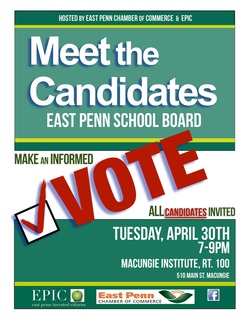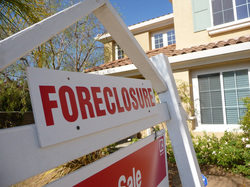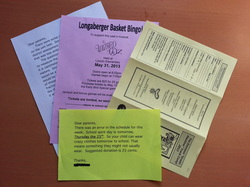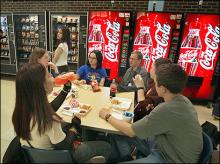 A final reminder that the main school board candidate forum is tomorrow night: Tuesday, April 30th, from 7-9pm at the Macungie Institute on Route 100 (see map below). Doors open at 6:30pm. I would love to see the room packed with public education supporters! The non-partisan groups organizing the event-- the East Penn Chamber of Commerce and the East Penn Invested Citizens-- are asking you to submit your questions for the candidates. You'll have an opportunity to do so in person (prior to 7pm), or email them now to [email protected]. I'm running for school board in large measure because I believe in this community and in the value of community service. Please join me tomorrow in making the candidate forum as successful as possible.
0 Comments
 photo credit: JefferyTurner via photopin cc photo credit: JefferyTurner via photopin cc Many of you have already seen the article I wrote for the new publications Emmaus Life and Lower Macungie Life. The message of the article is simple: Our home values are closely tied to the quality of our schools. This may not be the most important reason to support public education, but it is one that affects everyone in the community, not just those with kids. For those interested in learning more, visit my Get the Facts page that provides details about the relationship between home values and schools. I also include links to the original newspaper articles and research reports where this data is published, so you can read them for yourself. A reprint of my article is below.
 Have you heard something like this before? "Schools are so inefficient. They are so poorly run," the complaint goes. And then, "if only schools were run like private businesses, things would improve." No! Public schools are not businesses. Nor should they be. And the model of private business is not appropriate for improving public education. There are lots of reasons for this, but let me just mention two of the most important: First, private business and public schools have fundamentally different goals. Businesses exist for the purpose of making a profit for their owners. Public education, on the other hand, exists for the purpose of providing a public good; something that everyone benefits from. Students benefit of course, but so do private businesses (through employees with job skills), homeowners (through higher property values), taxpayers (through lower criminal justice and social welfare costs) and society in general (through an educated citizenry). Second, private business owners do not face the same set of constraints that public schools do. For example, businesses can decide on their suppliers; they can determine the quality and quantity of the things they buy to go into their business. Not so in public education. A key "input" in public schools are children, and the schools must take as many children as there are in the community, with whatever skills or limitations they bring with them. Jamie Vollmer, a former businessman and attorney, makes this second point powerfully in a well-known essay entitled The Blueberry Story. Please read it if you haven't before (the story isn't much longer than this post). There are lots of things we can do to improve public education in our community. But trying to run the district as if it were a Wal-Mart, or Exxon, or even a local small business, is misguided and will do little to solve the problems the schools face.  As every parent in the East Penn School district knows, our schools no longer provide students or parents with paper report cards. Instead, parents are expected to know when each grading period has ended, and log on to a special website to see grades. This policy is more than just silly: it is actively harmful to the mission of the district. Online report cards effectively make it more difficult for parents to keep informed about their children's progress, discouraging parental involvement. This is especially true for families who don't have reliable internet access, or are uncomfortable in the world of navigating websites, online passwords, etc. Yes, the district will provide a paper copy to such parents if they request it...but how many do? And why throw up these kinds of barriers in the first place? I'm told the answer is in cost savings. But today my son brought home four different printed pieces of paper from school, all dealing with mundane issues going on in the classroom and the district. This is an average haul for a day; sometimes there are more, sometimes there are less. Click on the image above to take a closer look them. Why not put these kinds of notices online too? The answer is simple: nobody would ever see them! But if notices about the school play, spirit day, and summer track camp are important enough to print and send home, on a daily basis, surely a student's grades are important enough to print and send home four times a year. The East Penn school board election will be largely determined by voting in the primaries on May 21st. And if you aren't officially registered with the Republican or Democratic parties, you will not be allowed to vote in this important election. No matter what your political philosophy, please make sure you are officially registered as a Republican or Democrat now. You can do so here. If you aren't listed at that site in either major party, or if you aren't registered to vote at all, fill out this form to make the change. Don't worry-- the form looks more complicated than it is (and you need to fill out the same form whether you are registering for the first time or just adding a party). Believe it or not, MONDAY IS THE DEADLINE! Make sure your voice of support for public education is heard. Have your application postmarked by Monday, or bring the form in person to the voter registration office in the Lehigh County Government Center, 17 S. 7th St., Allentown PA 18101 (map below). Any questions? You can call them at 610-782-3197 or visit the Project VoteSmart website.  photo credit: cindiann via photopin cc photo credit: cindiann via photopin cc One of the ironies of the information revolution is that finding relevant and accurate information can be more difficult than ever before. We are in fact buried by news, blogs, Twitter feeds, and other internet content; magazines and newspapers and newsletters; 24-hour news channels in every time zone; and books, increasingly self-published, on every possible topic. How do we figure out what is useful in this inexhaustible supply of information? How do you think critically about the accuracy and reliability of these sources? Fortunately we have experts in answering these kinds of questions: librarians! Librarian's are trained experts in the many ways of finding information. They can teach a set of skills that are seldom central in "regular" courses but increasingly indispensable in today's economy and society. Librarians, however, are often some of the first educational staff put on the chopping block by budget cuts. For many, librarians are just people who shelve books, or perhaps "extras" that we might do without. Maureen Sullivan, the president of the American Library Association, helpfully dispels this belief in an op-ed this past Monday. Her view reinforces the need to more aggressively transform education from the industrial model with which public schools were first developed to a model rooted in the new information economy (see posts on this subject here and here).  A great editorial in The New York Times this past Friday points out how our antiquated model of education-- based on factory production-- is a major obstacle to improving public schools. Countries with the very best systems have adapted to the information revolution. They approach teaching as a profession, akin to medicine or law, complete with rigorous standards, long-term apprenticeships, and collaborative knowledge building. It's the teachers, and the teaching, that matters. Our current system doesn't allow teachers to shine. I attended graduate school with the author of the piece, Jal Mehta. Read the editorial in full here: Teachers: Will We Ever Learn?  The East Penn Republican Committee is hosting a school board candidate forum TOMORROW (Monday, April 15th), from 7pm to 9pm at the Wescosville Recreation Center, 5047 Hamilton Blvd. Doors open at 6:30pm. Please consider attending to learn more about all the candidates as well as show your support for public education in our community! The public is welcome; you do not need to be a registered Republican to participate.  I am on the executive board of the Lehigh Valley Research Consortium (LVRC), which conducts social science research relevant to the local community. We recently completed a study of Lehigh Valley residents, asking them about what factors they consider most important when making housing choices. The result of over four dozen focus groups involving hundreds of people: the quality of the schools was the single most common factor people consider when people choose where to live in the region. What I found most interesting was that this was true even for those with no kids. You can read the full report for details on this and other data collected to help understand what the Lehigh Valley population wants in future economic and social development.  Most of the food served in school cafeterias is abysmal. Students at LMMS, for example, are required to take a fruit for lunch each day, in the name of good nutrition. One of the options? Canned pears swimming in sugar syrup! And this example only scratches the surface. No wonder many kids have such a difficult time understanding healthy eating, given what the schools present as a balanced meal. Making the problem even worse are the policies of allowing for-profit corporations to market and sell junk food directly in the schools through vending machines. An article I read today suggests just some of the reasons why this is poor school policy: it undermines the minimal nutritional standards of the school cafeteria, stigmatizes low-income students, allows corporate marketing campaigns to penetrate the schools, and makes understanding healthy food choices even more difficult. Read more in "Ridding Schools of Fast Food, Junk Food, and Soda Pushers" |
Details
Categories
All
Archives
December 2017
|
||||||
